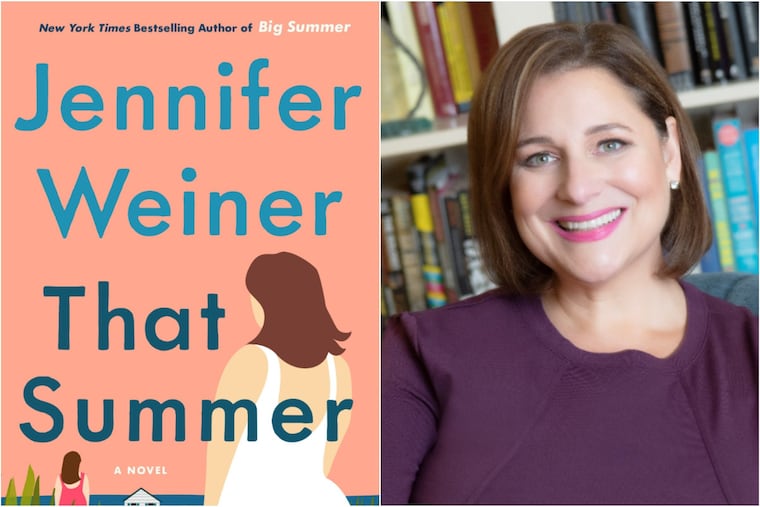Jennifer Weiner understands women. Her new novel, ‘That Summer,’ shows us why. | Book review
Every one of the 15 novels Weiner has written could be described as “me, too” stories. Her heroines are almost always smart, self-deprecating underdogs who haven’t been “seen” by the world.

That Summer
By Jennifer Weiner
Atria. 432 pp. $28
Reviewed by Maureen Corrigan
Jennifer Weiner’s latest novel, That Summer, is a #MeToo story; but, in a broader sense, every one of the 15 novels Weiner has written could be described as “me, too” stories. Her heroines are almost always smart, self-deprecating underdogs who haven’t been “seen” by the world. Some feel alienated from the normative roles of wife and mother. (“Me, too,” think many of Weiner’s readers.) Others feel bad about being “plus size” in a world where a woman, still, can never be too thin. (“Me, too.”) Still others feel cosmically lonely, or invisible, or ashamed that they have to reach for a pill or another glass of wine to get through the day. (“Me, too,” “Me, too,” Me, too.”)
Weiner, who lives in Philadelphia, has made a major literary career out of writing engrossing popular novels that take women seriously. At their most basic, all of her stories are about women trying to hold on to themselves in a world intent on diminishing them. That Summer is more explicitly a political novel than most in that its plot is informed by the rise of the #MeToo movement and the seismic shift in attitudes toward men who claim their actions should be excused because of their youth or because their victims were drunk or dressed provocatively or ... just because. The intertwined story lines of That Summer concern two women, both named Diana, who have been harmed in different ways by a man. And that’s only the beginning of what these “two Dianas” have in common.
That Summer opens with a prologue that is one long-held breath. Weiner writes it in present tense, as if the memory it evokes keeps replaying on a loop:
"She is fifteen years old that summer, a thoughtful, book-struck girl with long-lashed hazel eyes and a long-legged body that still doesn't completely feel like her own. She lives in a rowhouse in South Boston with her parents and two sisters, and attends a private school in Cambridge on a scholarship, where she gets mostly B's, except for A's in English and art. She dreams about falling in love."
This is Diana Starling, who takes a job as a mother’s helper on Cape Cod during that long-ago summer and meets a crowd of prep-school boys on the beach and is encouraged to believe that one of them — a sensitive, handsome guy named “Poe” — really, really likes her. He invites her to a big bonfire party on the last night of summer and, as Diana sits close to him, drinking something he’s handed her in a red Solo cup, she thinks, “This is the best night of my life.”
It's not. For years afterward, a traumatized Diana struggles and fails and struggles again to heal from the violence inflicted on her that night.
» READ MORE: Philly's Jennifer Weiner talks about her new book, "That Summer"
Daisy Shoemaker, our other “Diana,” is a 30-something wife and mother who lives on Philadelphia’s Main Line. Though her given name is Diana, she was renamed “Daisy” by her husband, Hal, during their dating days. Daisy thinks of herself as “short and dumpy,” in contrast to Hal, an older corporate lawyer who keeps himself in fighting trim. Daisy is a marvelous cook and had once dreamed of becoming a food writer, but her father’s early death and her own early marriage at 20 derailed those ambitions. Now Daisy feels lost and isolated, patronized by her husband and dismissed by her artsy, rebellious teenage daughter, Beatrice. When Daisy begins getting e-mails meant for the other Diana (their e-mail addresses are almost identical) the two begin an online correspondence that quickly develops into an in-person friendship. But those misdirected e-mails turn out not to be as random as they first appeared.
Weiner's braided plot not only alternates between the lives of two Dianas, but shifts around in time. The longest, compelling section takes place on Cape Cod, where the adult Diana Starling returns to live, working as a waitress and breathing in the silvery magic of a place she loved before it became a nightmare.
One of Weiner’s signature strengths as a writer is her ability to realistically depict how people change in body and soul. In her 2009 novel, Best Friends Forever, for instance, Weiner powerfully described how her heroine, Addie Downs, gradually inched out of her cocoon of loneliness and superfluous weight. Here, Diana’s never-to-be-finished healing spans decades on the Cape. When the adult Diana first arrives back at the Cape in offseason (courtesy of a loan of a cottage), the restaurant manager who hires her instantly sizes her up as a potential “washashore,” meaning “the misfits ... the folks who wash up here and decide to stay.” Diana’s first solitary year — filled with exhausting restaurant work, weekly trips to the library to stock up on novels, morning ocean swims, and the loving company of a rescue dog — eventually coheres into a full life. Weiner writes incisively, yet with restraint, about Diana’s incremental process of reclaiming some measure of peace.
That Summer is a compelling, nuanced novel about the long, terrible aftermath of sexual assault and the things that can be stolen from women that can never be fully restored. But, because it’s a Jennifer Weiner novel, it’s no polemic. It’s empowering in its own way. Weiner seems to steadfastly believe in the saving grace of humor, the ability of time to open up possibilities, and the strength of female friendship. Me, too.
Maureen Corrigan, who is the book critic for the NPR program “Fresh Air,” teaches literature at Georgetown University. She wrote this review for the Washington Post.